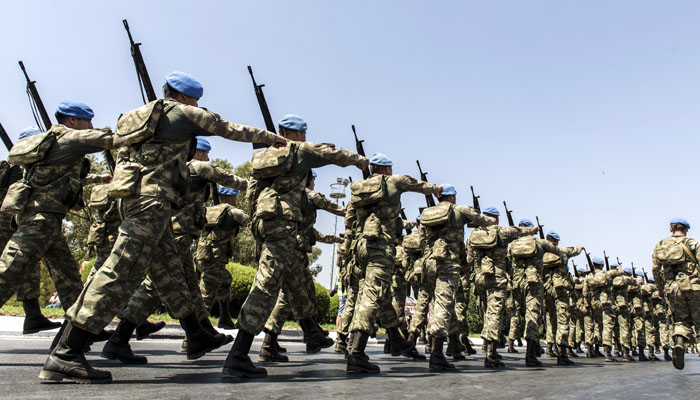The Turkish government budget for 2021, which has been submitted to parliament for approval, includes a huge increase in security-related spending and amounts in total to 138 billion lira ($17.3 billion).
Turkey’s Justice and Development Party (AKP) government has proposed a 15.7 percent budget increase in Turkey’s defense and security spending over the previous year’s figure of 119.2 billion lira ($14.9 billion).
The 2021 budget figures for the relevant public institutions and the increase in comparison to 2020 numbers are as follows:
- Ministry of Defense: 61.5 billion lira ($7.7 billion) (14.2%)
- Security General Directorate: 44.6 billion lira ($5.6 billion) (14.3%)
- Gendarmerie General Command: 27.7 billion lira ($3.5 billion) (20.5%)
- National Intelligence Organization (MİT): 2.6 billion lira ($326 million) (20.5%)
- Coast Guard Command: 1.5 billion lira ($188 million) (30.3%)
- Presidency of the Defense Industry (SSB): 120.1 million lira ($15 million) (19.1%)
- National Security Council Secretariat General: 38.1 million lira ($4.8 million)
With its 2021 budget, the Ministry of Defense took the lead in budget size among nine other ministries, including the Ministry of Justice and the Ministry of Environment and Urbanization.
The figures do not include the discretionary funds at the disposal of President Recep Tayyip Erdoğan. The funds are allocated to the presidency to be used without approval from parliament or any other state institution. The 2021 budget for the fund is 14.1 billion lira.
Turkey’s military spending in 2018 increased to $19 billion of its central budget, a 24 percent increase and the highest annual percentage increase among the world’s top 15 military spenders, according to a report by the Stockholm International Peace Research Institute (SIPRI), an independent international institute established in 1966 and dedicated to research into conflict, armaments, arms control and disarmament.
With the excessive defense and security spending, Turkey’s current account deficit is expected to widen. In September the Turkish lira hit a series of record lows against the US dollar, trading at one point at an all-time low of 7.8 to the dollar.
Defense expenditure increased following failed coup
According to critics, a coup attempt in July 2016 played a significant role in the increase of security-related expenditures in the country. Since then, the AKP has been conducting scores of domestic security operations against dissent on a daily basis, targeting mainly Kurds and alleged followers of Fethullah Gülen, a self-exiled Turkish cleric living in the US who is held responsible by the Erdoğan administration for the abortive putsch.
Around half a million people were detained and prosecuted in the aftermath, including soldiers, police, doctors and academics. According to some, a large number of military members dismissed and jailed in the aftermath of the coup were critical of Erdoğan’s domestic and foreign policies.
Following the coup attempt, Turkey also increased its cross-border operations, with the first one in Syria in August 2016. Critics say the increased budget for defense and security is a result of ongoing controversial military incursions and interventions in regions such as Nagorno-Karabakh, Libya, Syria and Qatar.
The international community, including NATO, has repeatedly criticized Turkey, the second-largest NATO ally in terms of military size, for its involvement in international conflicts and military deals conducted with Russia. Thus, it has faced sanctions from Western countries, including the US and Canada.
Earlier in October, Canada decided to suspend export permits for drone technology to Turkey since it has been using its drones in the recent Azerbaijani-Armenian conflict over Nagorno-Karabakh.
Foreign defense-related technologies are so crucial for Turkey that a much equipment, including Baykar drones built by Erdoğan’s son-in-law Selçuk Bayraktar, cannot operate without them, a situation making the country import dependent.
However, SSB Chairman İsmail Demir said in response to the recent Canadian move that Turkey would soon start to mass produce high-tech systems for the Baykar TB-2 drone.
Erdoğan controls defense-related decisions
Following the coup attempt, Erdoğan also took another important step by consolidating arms manufacturers and government procurement agencies under his control.
With a decree-law issued during a state of emergency in 2017, Erdoğan took the multi-billion dollar industrial-military complex, the Foundation for Strengthening the Turkish Armed Forces (TSKGV) run by various government agencies, under his direct control.
Moreover, the SSB, responsible for the procurement of most Turkish weaponry and currently running more than 460 programs valued at $35 billion, is directly controlled by Erdoğan.

